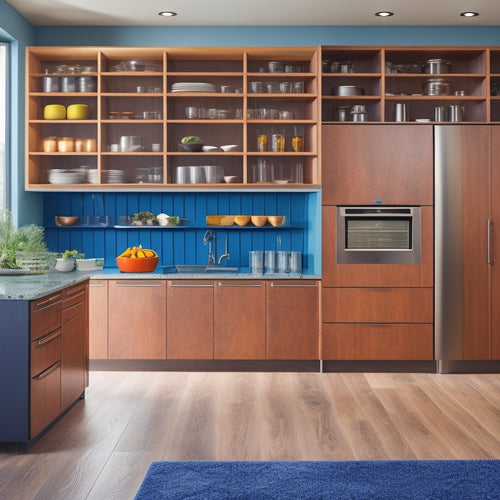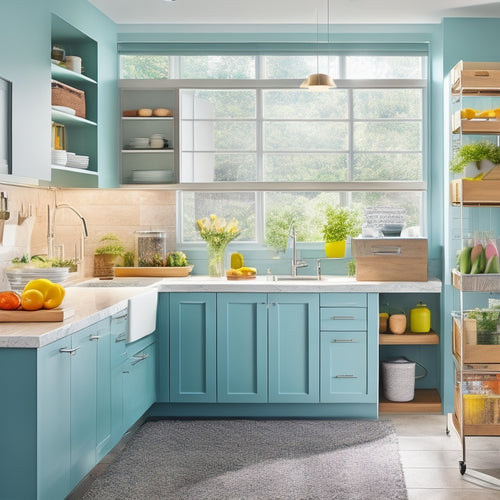
Produce Storage Hacks for Freshness
Share
Properly storing fruits and vegetables is essential to maintaining their freshness, flavor, and nutritional value. To achieve maximum freshness, understand the unique ripening patterns of fruits and control the ripening process with temperature control. Store ripe fruits in the refrigerator and place them in plastic bags for high humidity. Separate root vegetables from greens and avoid washing them until ready to eat. Managing ethylene gas emitters, such as bananas and apples, and storing berries and delicate fruits properly can also prolong freshness. By mastering these essential storage tips, you'll reveal the secrets to keeping your produce fresh for a longer period.
Key Takeaways
• Store fruits and vegetables separately, as some emit ethylene gas that accelerates ripening in others.
• Refrigerate ripe fruits and delicate fruits like berries immediately to prevent spoilage.
• Control temperature, humidity, and airflow to prolong freshness, with most produce stored in plastic bags.
• Remove tight bands and excess leaves to prevent moisture accumulation and promote airflow.
• Check stored produce daily for signs of mold or spoilage to maintain freshness.
Storing Fruits for Maximum Freshness
When it comes to storing fruits, understanding their unique ripening patterns is crucial for maintaining their freshness and flavor. The ripening process can be influenced by temperature control, with most fruits ripening best at room temperature.
Once ripe, fruits can be stored in the refrigerator to prolong their freshness. Place them in a plastic bag to maintain high humidity and prevent moisture loss. Berries, cherries, grapes, and figs require immediate refrigeration, and it's crucial to discard any moldy berries before storing.
Vegetable Storage Essentials
Proper storage of vegetables is critical to maintaining their flavor, texture, and nutritional value, as improper storage can lead to premature spoilage and a significant reduction in quality. Vegetable preservation techniques, such as removing or loosening tight bands, can help prolong freshness.
Proper vegetable storage methods involve storing vegetables in plastic bags, unless specified otherwise, and separating root vegetables from their greens. Most greens from root vegetables stay fresh for about 3 days. Avoid washing vegetables until ready to eat, as excess moisture can lead to spoilage.
Managing Ethylene Gas Emitters
Many fruits and vegetables, such as apples, avocados, and bananas, are ethylene gas emitters, which means they release a natural gas that accelerates the ripening process of surrounding produce. Effective ethylene management techniques are essential in preventing premature ripening and prolonging freshness.
To control ethylene gas, store these emitters away from other produce to slow down the ripening process. This simple yet vital step can significantly prolong the shelf life of your fruits and vegetables.
Berries and Delicate Fruits Storage
Berries and delicate fruits, such as cherries, grapes, and figs, require immediate refrigeration to maintain their freshness and prevent spoilage. This is essential in fruit preservation techniques, as even a short delay can lead to mold and decay.
To preserve delicate fruits, follow these simple steps:
- Store berries loosely in a shallow container covered with plastic wrap to maintain airflow and prevent moisture buildup.
- Remove any stems or leaves from berries to prevent moisture accumulation.
- Check berries daily for signs of mold or spoilage and remove any affected berries immediately.
- Don't wash berries before storing; instead, gently rinse them just before consumption.
- Consider freezing berries to extend their shelf life, especially for delicate fruits like figs.
General Produce Storage Tips
Most fruits and vegetables can be stored effectively using a few simple techniques, including controlling temperature, humidity, and airflow. Proper storage helps maintain freshness, reduces spoilage, and guarantees food safety.
When it comes to root vegetable care, separate the roots from their greens for storage, as the greens typically stay fresh for only about three days. For green leafy storage, avoid washing the leaves until ready to eat, as excess moisture can lead to spoilage.
Store vegetables in plastic bags, unless specified otherwise, and remove or loosen tight bands to promote airflow. By following these general produce storage tips, you can enjoy your fruits and vegetables for a longer period while maintaining their nutritional value and flavor.
Frequently Asked Questions
Can I Store Cut Fruits and Vegetables Together in the Refrigerator?
When storing cut fruits and vegetables together in the refrigerator, be aware of cross contamination risks. To minimize risks, separate items into individual containers and store under ideal storage conditions, such as maintaining a consistent refrigerator temperature below 40°F (4°C).
How Often Should I Check on Stored Produce for Spoilage?
'Think of stored produce as a fragile garden, requiring gentle care. Check regularly, just as a gardener tends to their plot, to prevent waste and guarantee freshness, rescuing ripe treasures from the brink of spoilage.'
Are All Types of Plastic Bags Suitable for Storing Produce?
Not all plastic bags are suitable for storing produce. Choose reusable containers, vacuum sealers, perforated bags, or breathable wraps that allow for airflow and moisture control, ensuring ideal storage conditions for fresh produce.
Can I Store Fruits and Vegetables in Airtight Containers?
As the ancient Egyptians preserved fruits in clay vessels, so too must we prioritize proper ventilation and temperature control when storing fruits and vegetables in airtight containers, ensuring ideal freshness and food safety.
Will Storing Produce in the Dark Help Preserve Freshness?
Storing produce in darkness can help preserve freshness by reducing light exposure, which can stimulate metabolic processes that lead to spoilage. Darkness slows down ripening, allowing for longer storage periods and maintained quality.
Related Posts
-

Roll-Out Trays for Modular Kitchen Cabinets
Roll-out trays are the perfect addition to your modular kitchen cabinets, enhancing both accessibility and organizati...
-

Sink Storage Solutions for Open-Concept Kitchens
To maximize storage in your open-concept kitchen, focus on clever under-sink solutions and vertical space utilization...
-

Creative Corner Cabinet Space Management
Creative corner cabinet space management turns neglected nooks into stunning storage solutions. You can maximize vert...


